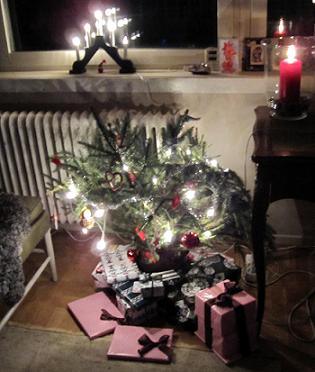«Искусство подарить и получить» [The Art of Giving and Recieving] Posted by josefina on Dec 29, 2009 in Culture, language, Traditions
While most of the world has already received their holiday «подарки» [gifts (plural of «подарок»: present, gift; presentation; pledge, donative)], Russia is still waiting for the main holiday of the year when it is custom to «подарить и получить» [give (pfv.) and receive (pfv.); their imperfect ‘verb comrades’ are «дарить» and «получать»]. Whereas most of the world’s Christian countries celebrate «Рождество» [Christmas] on the 24th (shout out to Sweden!) or 25th of December, «Русская православная церковь» [The Russian Orthodox Church] still today commemorates «христианские праздники» [Christian holidays] according to the Gregorian calendar that was used in Russia «до Октябрской революции» [before the October Revolution (sometimes old Soviet textbooks refer to this time simply as «до Октбря» [before October])]. In Russia we’ll all have to wait approximately another two weeks for «рождество Христово» [the birth of Jesus Christ] as this holiday arrives in the eastern Motherland only by «7 (седьмого) января» [January 7th]. Instead, gifts are given and received in Russia during the night between December 31st and January 1st because the biggest holiday of the year in this country is «Новый год» [New Year]. The blog’s «дорогие читатели» [dear readers] probably all knew about this interesting fact, not only because I’ve blogged about it here and there before, but also because it is one of the first things a Russophile finds out when getting acquainted with Russian traditions. All you need to do in order to confirm the importance of «Новый год» [New Year] to Russian culture is watch the movie «Ирония судьбы, или С лёгким паром!» [“The Irony of Fate, or Enjoy Your Bath!”]. It is shown on Russian TV numerous times around New Year’s Eve (that’s the tradition) and thus impossible to miss. But let’s talk about that movie some other time. Today’s all about «подарки» [presents, gifts]!

This year we didn’t have a proper «ёлка» [fir tree, cone-bearing evergreen tree], but something more resembling a «куст» [bush, shrub; cluster]. Nevertheless, there were plenty of «подарки под нашим рождественским кустом» [gifts under our Christmas bush].
In Russia it is not mandatory to wrap «новогодние подарки» [New Year’s gifts]. This might sound strange to us who have been brought up thinking that creating imaginative wrapping is half the fun of giving (and receiving!) gifts – be it for Christmas or for your birthday. For example, in late November I discussed with Russian students in my Swedish class what they wanted for New Year’s this year. I told them that in Sweden we separate the two possible kinds of presents one can receive: «мягкие подарки» [soft gifts] and «твёрдые подарки» [hard gifts]. They all looked like big question marks when I said this. Thus I was forced to explain that ‘soft gifts’ are such things that make the wrapping feel ‘soft’, like a sweater or a pair of socks, whereas ‘hard gifts’ feel ‘hard’ to the touch before you open them and usually contain things like books or movies or skies. Russians are foreign to this concept mainly because they don’t wrap their gifts, but place them inside «подарочные упаковки» [(plural) gift packages] which resemble small, square-shaped bags. These bags come in all kinds of sizes and are often very beautifully and seasonally decorated – sometimes they even sparkle! But you can never tell just from looking at or squeezing such a bag if the containment of it is ‘soft’ or ‘hard’. When I was a kid growing up in Sweden we would always squeeze all the gifts under the tree in the morning to try and guess what we would get… Obviously my Russian students had no such childhood memories and could not relate to this. Of course you can still wrap your gifts in Russia if you feel like it. But you really don’t have to. Often it is not expected. I’ve celebrated «Новый год» [New Year] in Russia five times, and never received a gift that was wrapped. In the first years I’d wrap my gifts, but after a while I stopped and just used those cute little bags instead. After all, «это гораздо быстрее» [it is much faster]!
Let’s have a look at some useful, seasonal glossary:
«подарок» (plural: «подарки») – [present, gift; presentation; pledge, donative]
«подарок ко дню рождения» (also: «подарок на день рождения») – [birthday present, gift]
«рождественский подарок» – [Christmas present]
«получить (perfect) что–нибудь в подарок» – [to recieve something as a gift, present]
«подарочный» – [(adjective) gift-, present-]
«подарочный набор» – [a gift set]
«подарочное издание» – [a coffee table book]
«подарить» – [pfv.: to give, grant, bestow; donate; remember; present, compliment]
«дарить» – [impfv.: to give, grant, bestow; donate; remember]
«дар» – [gift, donation, grant; endowment, faculty; boon; pledge, token]
«принести в дар» – [pfv.: to give as a gift]
«дарование» – [gift, endowment, ability, faculty]
«даровитый» – [gifted, talented; clever]
«дарёный» – [(adjective) received as a gift]
«дарёному коню в зубы не смотрят» – [“don’t look a gift horse in the mouth”]

Build vocabulary, practice pronunciation, and more with Transparent Language Online. Available anytime, anywhere, on any device.




Comments:
pup:
Another great post. Happy New Year, everybody!
P.S. With all due respect, Jo, the titile should be changed to “Искусство дарить и принимать” for it sound more Russian. Or may it be that I’m overlooking something? 😉
Elizabeth H. (Russia):
I received one wrapped gift this year. It was very beautifully-wrapped! I think the effort is always appreciated even though the gift bags are more common.
Svetlana:
Well, about wrapping gifts… I think, it depends, because in my family we traditionally wrap them) and we always do it ourselves)
This year we had over 30 wrapped presents under the NY tree! It looked great)